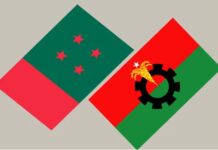Political violence and unrest centring on war crimes verdicts in the past two years cost the economy about $2.20 billion, equivalent to 1 per cent of gross domestic product, the World Bank said in a report submitted to the finance ministry in the past week.
The report highlighted development agenda and branded Bangladesh as a country of religious harmony, but said that the killing of secular bloggers in 2015 indicated growing extremism.
‘Unrest during election periods and following recent war crimes verdicts have often paralysed civil and economic activities: Political violence around the 2014 elections led to more than 500 deaths, and turmoil in the first quarter of 2015, sparked by the one year anniversary of the 2014 election, resulted in 100 more deaths and is estimated to have cost Bangladesh $2.2 billion or about 1 per cent of the GDP,’ reads the report.
Focusing on almost every segment of the country’s economy, culture, history, independence and industrialisation, the report said that BRAC and Grameen Bank had made tremendous contributions to the uplifting of socio-economic status of the poor.
‘A strong civil society and grassroots movement emerged in the wake of the 1971 war to provide assistance to impoverished communities. Institutions like BRAC and Grameen Bank are world-renowned for their development work and have pioneered innovative mechanism to respond to the needs of the poor,’ the report said.
‘Since independence, relations among these groups have been mostly harmonious, and Bangladesh’s society as characterised by a strong cultural bond and national identity, but the killing in 2015of secular bloggers and publishers has raised concerns about growing extremism,’ it reads.
The report said that since the country’s return to electoral democracy in 1991, two major political parties, the Awami League and the Bangladesh Nationalist Party, had dominated politics.
It said that the government alternated between the AL and the BNP in the 1990s and 2000s until the AL government returned to power for a second consecutive term in 2014, following a boycott of the elections by the BNP. Increasingly confrontational politics have also resulted in long stretches of general strikes and transport blockages, the report stated.
It said that despite continuous feuding, governments across the political spectrum had exhibited strong commitment to the country’s long-term development agenda.
Although institutions in Bangladesh remain weak, successive governments have maintained macro-economic stability, and made efforts to liberalise trade, reform the financial sector and limit interference in business, the report added.
The report did not specify the sectors that was hit hard by prolonged political violence in 2014 and 2015 and refrained from giving the details of economic costs to justify the estimated economic loss of $2.20 billion.
The finance ministry officials concerned said that they were yet to go through the report.
Source: New Age











It’s a excellent site to get the relevant information in quick time.